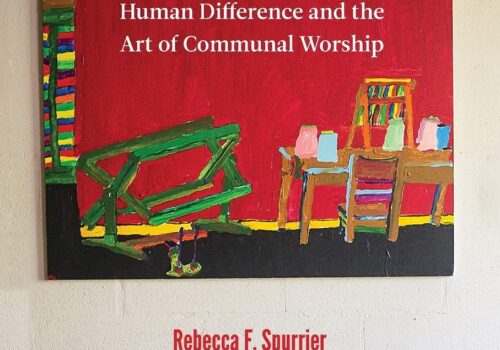Download PDF: Mahan, Warren, and White, Awakening Youth Discipleship
By Brian J. Mahan, Michael Warren, and David F. White
Eugene, OR: Cascade Books, 2008. 126 pages. $17.00.
The authors of Awakening Youth Discipleship seek to expand the “practices” discussion introduced to youth ministry with “communitarian-narrativist approaches” by calling for the addition of practices of discernment and conversation that reveal and combat cultural distortions. Borrowing from Marxist influences such as Paulo Freire, they advocate practices of resistance in youth ministry that inform the consciousness of youth and encourage them to “dehabituate themselves from the toxic images and beliefs of consumer culture” (xii).
The book is divided evenly among the three authors. In the first section, David White offers a brief history of adolescence with attention to the ways in which youth have been alienated from their proper roles as responsible agents in society. As Associate Professor of Christian Education at Austin Seminary, he argues that youth have been alienated from families, the common good, their own innate passions, significant social roles, vocations, and faith communities. They are prevented from proper human flourishing by a consumerist culture that offers them carefully circumscribed and woefully benign roles. Most troubling, says White, is that youth ministry in many places has co-opted the values of the surrounding culture and become a means of simply domesticating youth. To counter the seduction of a culture that lulls youth into numbed acquiescence, White calls on youth ministry to offer experiences of “intellectual conversion” that awaken youth to the broken complexity of the world and the possibility of becoming agents of healing (23). Awakening youth to the spiritual and structural realities of the world opens the possibility for lifelong faith – one of the proper tasks of youth ministry, argues White. Drawing from Freire and other Marxist educators, he offers several techniques for helping youth move beyond consumerist scripts by viewing their world and selves critically.
In the second section, Michael Warren dissects the “standard account,” which portrays adolescents as engaged in a psychic struggle for identity. Professor of Theology and Religious Education at St. John’s University, critiques Erik Erikson, preferring Charles Taylor’s notion of identity as a set of malleable commitments and ways of judging the world. Youth ministry then amounts to leading youth carefully into a gospel-induced identity crisis in which they encounter “a set of commitments and identifications they may not have yet considered” (58). Thus, the goal of youth ministry is not entertainment, but the acquisition of gestures and skills of discipleship that foster Christian identity – attitudes and practices that are culturally odd in a world where closed-fist “gestures of consumerism” are more the norm (62).
In the final section, Brian Mahan, formerly of the Candler School of Theology, argues for practices of confession that reveal our own seduction by the cultural scripts of success and consumerism. Through modeling such “sacred commiseration,” leaders grant youth the freedom to confess their own cultural attachments (105). Mahan believes such commiseration is important because it allows us to move beyond mere accusations about consumerist culture to true repentance.
Awakening Youth Discipleship is the outcome of a decade of formal and informal dialogue among the three authors, and at times readers may feel as if they have just stumbled into the middle of a conversation in progress. Certainly, the book is elegant in its brevity: it runs a mere 126 pages in which the authors set forth a compelling rebuttal of youth ministry under the conditions of conspicuous consumption. Unfortunately, such brevity also results in numerous underdeveloped themes. The authors offer scant discussion of the slippery term “discipleship” and its various definitions in youth ministry. Additionally, Warren limits his discussion of Eucharistic theology to a paragraph, despite the fact that he proclaims it to be central to his logic of youth ministry. Readers are also introduced to “communitarian-narrativist approaches to youth ministry,” but the authors neglect this discussion and are at times vague as to how their proposals actually extend such pedagogies, preferring instead to contrast their proposals with glitzy consumerist evangelical or seeker-sensitive models (xii). In short, Awakening succeeds in giving an enticing sampling of an alternative vision of youth ministry, but readers will want to consult other works by these authors to find a fuller treatment of the model of youth ministry introduced here.
Despite its shortcomings, Awakening Youth Discipleship provides an excellent critique of much that is considered standard fare in youth ministry. The authors reprove models of youth discipleship concerned with little more than personal salvation by reframing the telos of youth ministry in terms of human flourishing and the Kingdom of God. While it is not new to critique games-and-glam youth ministry for co-opting consumer culture, the authors argue that even youth ministry focused on practices such as hospitality, forgiveness, and testimony may be no less beholden to middle-class consumerism if it fails to reveal and resist cultural distortions. Also, Warren’s contention that youth ministry should rely less on Erikson and more on Taylor for help in speaking of identity is worthy of further consideration. He is right that we often define youth based upon the perceived inner psychic struggle for identity and without full consideration of the influence of culture, community, and faith.
Overall, Awakening Youth Discipleship thoughtfully counters the dominant form of youth ministry that tacks faith onto middle-class values, and it provides an alternative plan for youth discipleship that questions and transforms the orientations and commitments of youth. As such, it is a valuable, even prophetic contribution to the current literature on youth faith formation. It is suitable for use in graduate courses on youth ministry, but it is also accessible in length and style to the informed practitioner. While its pedagogical suggestions may be best received by progressive or mainline audiences familiar with Marxist critique, its unique perspective on the cultural betrothal of contemporary youth ministry is also likely to gain a hearing among evangelical audiences.
Andrew Zirschky
Princeton Theological Seminary




